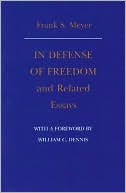

 |

|

The average rating for In Defense of Freedom and Related Essays based on 2 reviews is 4.5 stars.
Review # 1 was written on 2015-12-01 00:00:00 Brian Shipton Brian ShiptonI am very impressed with Frank Meyer's essays In Defense of Freedom. The 1996 edition I read had even more essays than the original 1962 edition. Reading these essays requires concentration and makes one consider the ideas long after the reading is done. I will soon study much of this book in greater detail in order to firm up my conclusions. Much of the concept of conservative thought that Meyer proposes was already on my mind, but he brought me more perspective on both freedom and tradition. He also helped me understand what is different in the European meaning of the terms conservative and liberal compared to the terms in the US. In one essay, Meyer discusses the origin of the idea of independent individuals in Western thought. The concept of freedom and limited government have reached their current peak in the US constitution. The idea of utopianism in the US today, which is contrary to our constitution, is part of the liberal thought in the Democratic party and also of the neoconservative wing of the Republican party, both of which insist on government solution to all problems, whether secular or religious solutions. |
Review # 2 was written on 2019-05-11 00:00:00 Edward Wojan Edward Wojan"Freedom". Hollywood movies have made it melodramatic; politicians, a punchline at the end of a bad speech; and the cognitive dissonance whereby the word falls so easily from the lips of those who would enslave us has made it almost meaningless. "Liberty" - for what does it mean? That is debated ad infinitum and ad nausea in the ivory towers of our 'betters' and on the street corners where young men rage against a system which has left them behind. Left them behind, for when they talk of freedom they are not speaking of the three fundamental rights by which we are made free - those of life, liberty and property - but instead of a job and a dowry for which to marry their betrothed and a savings account they can contribute to for the coming days when old age starts to gnaw and bite. But is that liberty? "Freedom from…" juxtaposed against "freedom to…" and then again maybe it's found in that perfect balance between liberty and equality, as Edmund Fawcett writes. Is it utilitarian, like John Stuart Mill says - the greatest good for the most? Or is it absolute, as Meyer contends in this his greatest treatise "In Defense of Freedom". One of the things that makes this challenging is that conservatism itself is torn between two ideas, balanced or not, which are at war against each other. Libertarianism - to stand naked, valueless and community-less and truly alone and still to survive, somehow; juxtaposed against culture and community and that embroidered quilt knitted over time upon which successive generations preserve what is the best of themselves to pass it on to those who follow. Libertarianism which quickly becomes libertinism as the empty vessel of the human soul is filled with licentious possibilities and the ever-present tyranny of now; or the stifling jacket of conservatism tailored in days of yore when things were meant to be uncomfortable and restraining, and still worn for decorum in defiance of a world that has invented new ways of dress. This tension, while appropriately balanced in times of peace, is strained in times of war. And these are times of war. For freedom is under attack, as assuredly as are the conservative values imbued with libertarianism by which we protect ourselves. That is really my main challenge with Meyer in days when our ideologies must be weaponized. To be sure though, Meyer's liberty is beautiful: "There is this much truth to John Stuart Mill's doctrine that truth will always prevail in the free marketplace of ideas, and this much only: given a society free of the power of a totalizing state, truth will survive alongside all the errors and will outlive each of them. Nor, given the human condition, can we expect more. Freedom, which is of the human essence, implies the possibility of producing error as well as finding truth. To achieve a good society requires men unremittingly devoted to the pursuit of good and truth, but it requires also that no one have he power to impose beliefs by force upon other men - and this is whether those beliefs be false or true." I even believe it. But how will it protect us from them? Yes, truth will outlive the lies - but how many people will die while we wait?… if waiting is the only answer the classical liberals will allow us. 100,000,000 is the number of people the communists (class socialists) took from us, mothers and fathers and aunts and uncles and children; more if you count those starving in Venezuela today. 20,000,000 the Nazis (national socialists). Russell Kirk or Frank Meyer; Patrick Deneen or Gary Johnson - because John Maynard Keynes will not go down without a fight; his wares are peddled too effectively and while, yes, they will eventually be proved wanting, when they are at last expunged in the fires of truth they will take our great republic with them. Alas, a fight is what we must have. Because who will protect us from them? Sacrificed as we will be like Robert the Bruce screaming 'freedom' as our entrails are put on display for the collective hordes who bay for the blood of sacrifices to feed their collectivist project; and who know well the answer to their own question "Who will protect them from us?" |
CAN'T FIND WHAT YOU'RE LOOKING FOR? CLICK HERE!!!